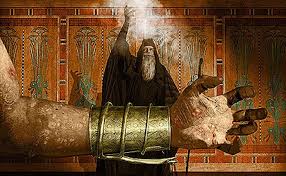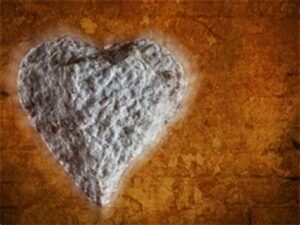Moses Tossed Soot in the Air
and Festering Boils Broke Out All Over Egypt
9: 8-12
Moses tossed soot in the air and festering boils broke out all over Egypt DIG: What part is played by the soot? The boils? The magicians? Pharaoh’s heart?
REFLECT: Is your heart toward God soft as putty? Firm and alert? Or rock hard? Why? If God wants all mankind to know Him, why harden Pharaoh’s heart?
As the second cycle of plagues came to an end, this one, like the swarm of insects, came without warning. Perhaps since words had no effect on Pharaoh, none were wasted. Then ADONAI said to Moses His servant: Take handfuls of soot from a furnace. The furnace spoken of here was used for making bricks, and as a result was a symbol of Isra’el’s slavery (1:14, 5:7-19). It was by their sweat and tears that they made bricks for the Egyptians. Therefore, it was ironic that the very soot made by the slaves of Egypt was now to inflict punishment on their oppressors.
In addition to that, God said: Have Moses toss it into the air in the presence of Pharaoh (9:8). Amenhotep II was to witness the miraculous nature of the plague, and as a result, would be without excuse. He would be unable to explain away the nature of the plague. It came through God working through His prophets. When magicians would pronounce a curse on an individual, a village, or a country, they took ashes of cow-dung, or those from a common fire, and threw them in the air, saying to the object of their displeasure, “Such a sickness or such a curse shall surely come upon you.”153
ADONAI said it would become fine dust over the whole land of Egypt, and festering boils would break out on men and animals throughout the land (9:9). Part of the miraculous nature of this plague is the multiplication of the handfuls of soot into the fine dust that would cover the whole land of Egypt. In addition, the divine nature is reflected in the changing of one substance, soot, into another, dust. Finally, the effect of dust in bringing disease upon people and animals also points to the plague’s supernatural make-up.154 The type of disease is unknown. But whatever it was, we know it was dangerous and caused much suffering. This will be a foreshadowing of the wrath of God in the end times (see the commentary on Revelation, to see link click Eb – The First Bowl: Ugly and Painful Sores).
The thing that is common to both the sixth and fifth plagues was the fact that in each of them, the animals of the Egyptians were attacked. Thus, we see again the Divine hand in the arrangement and order of these different plagues.155

Moses did exactly as God had commanded and the result was exactly as He had predicted. So they took soot from a furnace and stood before Pharaoh. Moses tossed it into the air, and festering boils broke out on men and animals (9:10). Once again the Egyptians got what they deserved. The sixth plague became a proverb in ancient Isra’el. Years later Moses would warn the Hebrews that if they disobey God’s commands: ADONAI will afflict your knees and legs with painful boils that cannot be cured, spreading from the soles of your feet to the top of your head (Deuteronomy 28:35). This may explain why: the magicians could not stand before Moses because of the boils that were on them and on all the Egyptians (9:11). The fact that they were called at all shows the hardness of Pharaoh’s heart. This is the final mention of the Egyptian magicians in the plague account. They appear more helpless than ever. They could not reproduce the plague, they could not remove it, nor could they escape it because they were similarly affected as they found their own deities powerless.
This plague, like the previous ones, most assuredly had religious implications for the Egyptians. While it did not bring death, it was serious and painful enough to cause many to seek relief from many of the Egyptian deities charged with the responsibility of healing. Imhotep was the god of medicine and Serapis was the god of healing. Thoth was the god of magic and healing. Isis was the goddess of healing. It was thought that through the use of her magic and healing arts, she brought Osiris back to life.
Sekmet was one of the most important deities of the Egyptian pantheon. Her name meant one who is powerful, and she had the body of a woman and the head of a lioness. It was said that her breath created the desert and she was seen as the protector of the Pharaohs. She was the goddess who supposedly had the power to cause or stop disease. Called the Lady of Ma’at, her primary duty was the maintaining of order in the universe. Her priests were often the healers of the sick, but they could neither cause nor stop the plague of boils.
The priests who served in the Egyptian temples had to be clean, without any type of breaking out or sickness. Suddenly this plague of boils came upon them and they were unclean, and unfit to serve in the temples. There were over a thousand temples in Memphis alone, and the priests served in all of them.156 But this brought a halt to all of the false worship in Egypt. There was nothing Imhotep, Serapis, Thoth, Isis, Sekmet or the priests could do about it. They were all out of business because they had met the One who is powerful.

This plague marks another turning point; for the first time God does the hardening of Pharaoh’s heart, thus confirming the sin that was already there. But God hardened Pharaoh’s heart because he would not listen to Moses and Aaron, just as ADONAI had said to Moses (9:12). So the second triad of plagues came to an end. However, Pharaoh did not ask Moses to pray for him on his behalf on this occasion.
At this point, although Pharaoh, the magicians and the people of Egypt are, and have been, in pain, no one was asking for forgiveness. No one sought out the God of Heaven to repent. They were still doggedly looking to the gods of Egypt to protect them. It will be the same during the Great Tribulation (Revelation 16:2). After the seven last plagues, torture the entire world, seven bowls of wrath will be poured out on mankind. Nevertheless, men and women will gnaw their tongues in agony and curse the God of Heaven because of their pains and their sores, but they will refuse to repent of what they had done (Revelation 16:10b-11). As before, the plagues of Egypt serve to foreshadow the plagues that are to be directed upon the ungodly in the last days. But they will be much greater and more extreme. They confirm the nature of the final judgment against the followers of evil.157



Leave A Comment